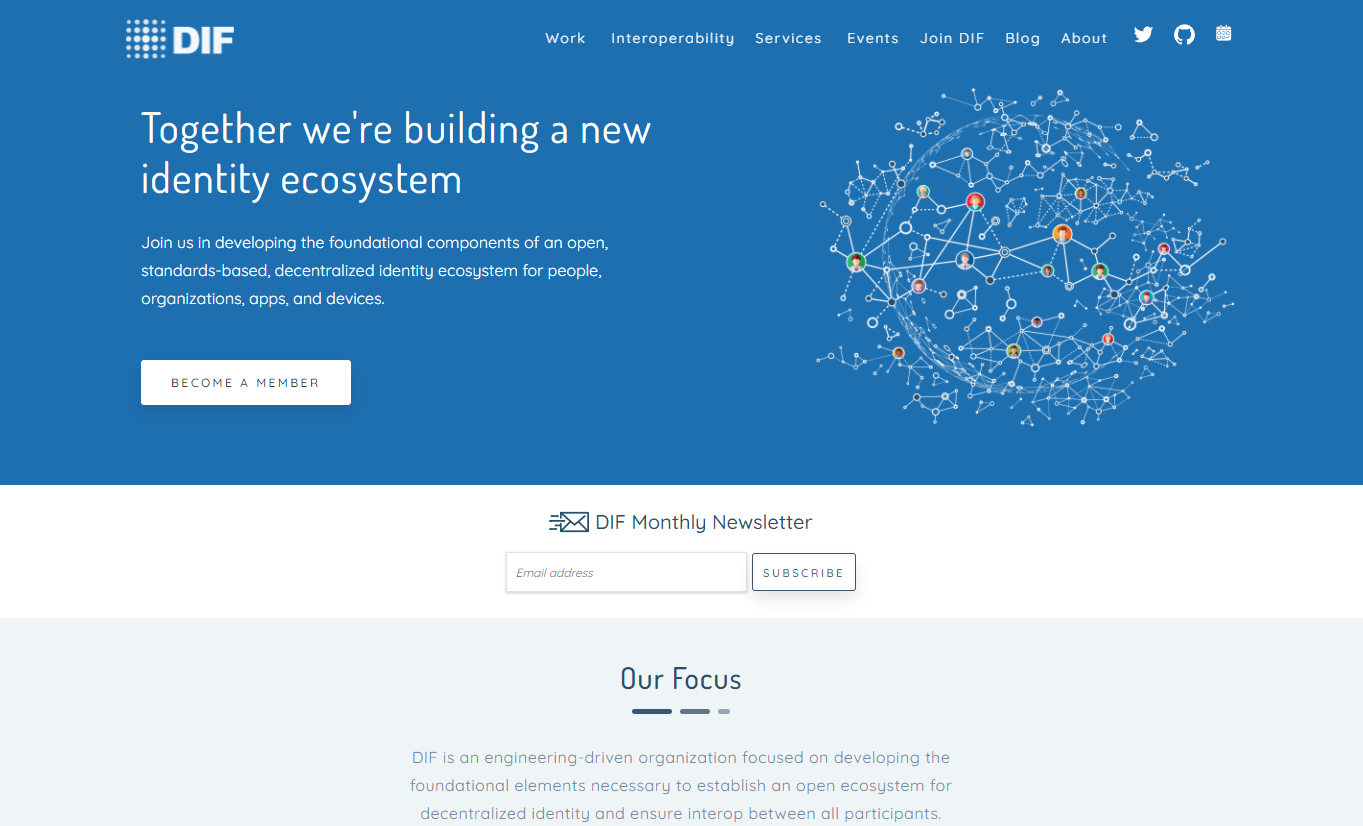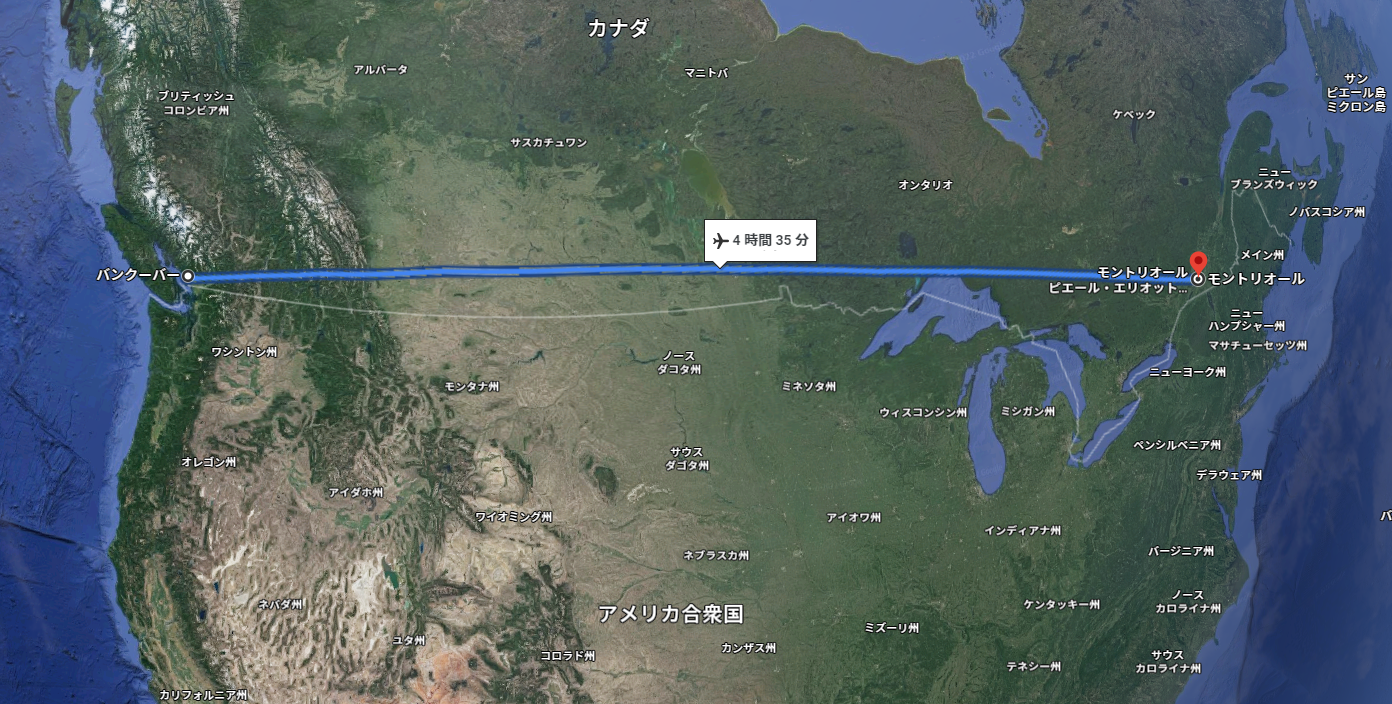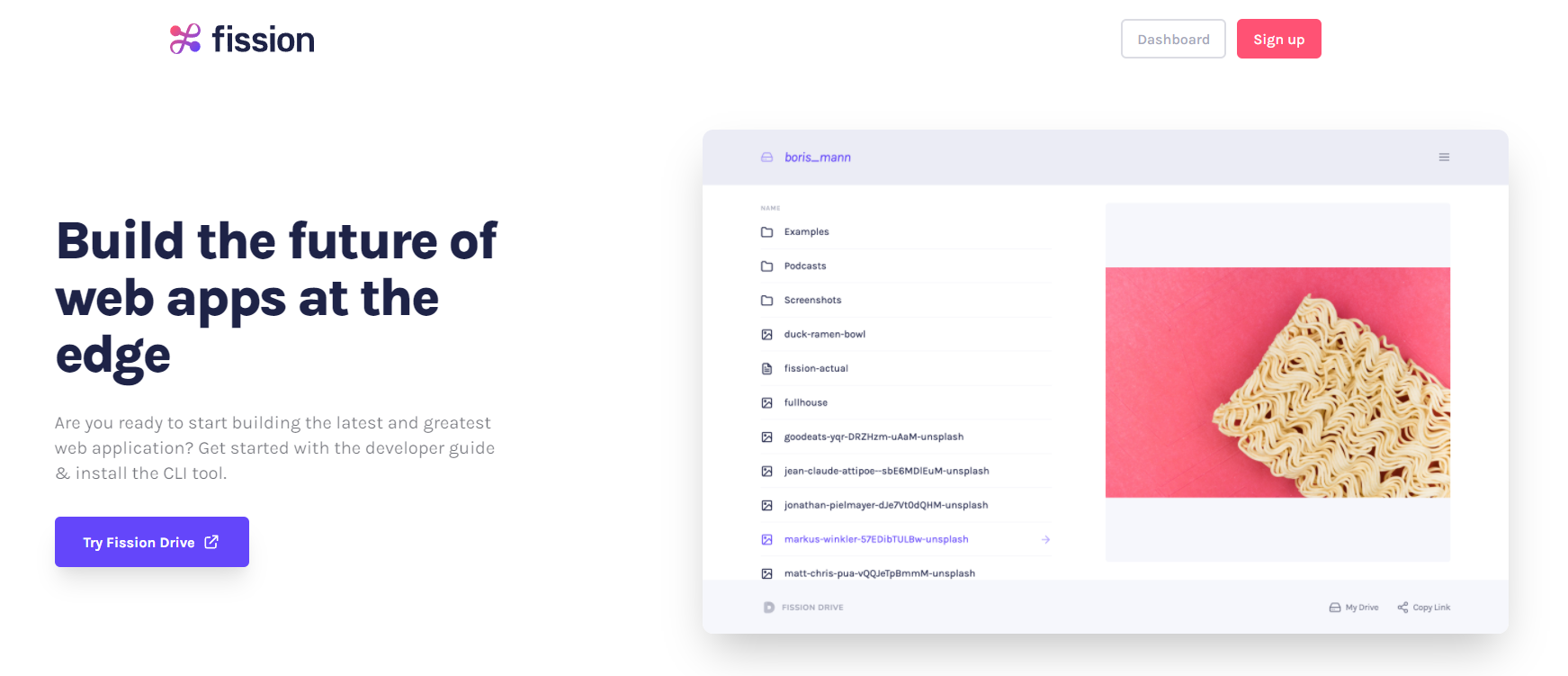piacere です、ご覧いただいてありがとございます ![]()
I'm piacere, the 4 Elixir communities founder/organizer, thank you for reading! ![]()
Elixir界のエッジコンピュータとIPFS(InterPlanetary File System:惑星間ファイルシステム)、DIDの専門家、Brooklyn ZelenkaのElixirエッジコンピューティングPodcast「Brooklyn Zelenka and The Exciting World of Edge Computing」の翻訳をお届けします
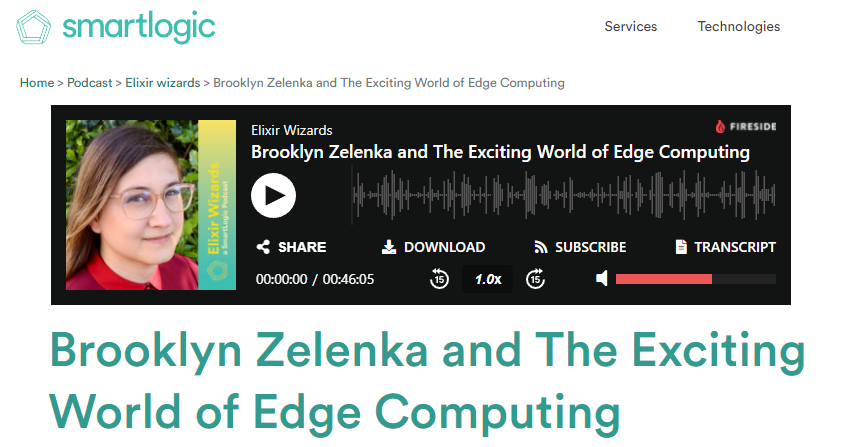
このPodcast翻訳シリーズの目次は下記です
[翻訳] ①Brooklyn Zelenka and The Exciting World of Edge Computing
|> [翻訳] ②Brooklyn Zelenka and The Exciting World of Edge Computing
|> [翻訳] ③Brooklyn Zelenka and The Exciting World of Edge Computing
|> [翻訳] ④Brooklyn Zelenka and The Exciting World of Edge Computing
- Elixir is connected to the space : Elixirが宇宙に繋がる -
(English version)
Nice to meet you, Brooklyn Zelenka.
As an Elixir developer for the past 7 years, I've been taken part in edge computing and satellite image analysis with Elixir, along with web development and AI/ML development.
And what I want to do in the future is to realize interplanetary internet and inter-satellite communication with DTN (Delay/Disruption Tolerant Networking) by Elixir, and I started to aim for that opportunity a little bit around 2018.
As such, listening to your talk delivered at Elixir Wizards this time lit a fire in my heart!
I first heard of you when you spoke at ElixirConf US 2021 on a topic that piqued my curiosity, "The Jump to Hyperspace," and it was at the same event that I first appeared at ElixirConf, so I felt a sense of destiny and decided to translate your podcast.
This is a four-part series, have fun!
If you would like to help, please click the "LGTM" button in this article and support us!
(日本語バージョン)
はじめまして、Brooklyn Zelenka 様
7年前からElixir開発者である私は、Web開発やAI・ML開発と並行して、Elixirによるエッジコンピューティングや衛星画像解析に携わってきました
そして、私が将来的にやりたいことは、惑星間インターネットや衛星間通信をElixirによるDTN(Delay/Disruption Tolerant Networking)で実現することで、その機会を2018年頃から少しだけ目指すようになりました
そんな私が今回、Elixir Wizardsで配信されたあなたのトークを聞いたことにより、私のハートに火が点きました
あなたを知ったのは、ElixirConf US 2021で「The Jump to Hyperspace」という私の好奇心をくすぐるテーマで登壇したときで、私が初めてElixirConfに出演したのも同じ会でしたが、何か運命のようなものを感じ、あなたのPodcastを翻訳しようと決めました
4回に分けてお届けします … 楽しんで!

 There are 16 Elixir Advent Calendar, making for a hot winter!
There are 16 Elixir Advent Calendar, making for a hot winter! 

We are experiencing an unprecedented level of excitement ... Please support/subscribe ![]()
https://qiita.com/advent-calendar/2022/elixir
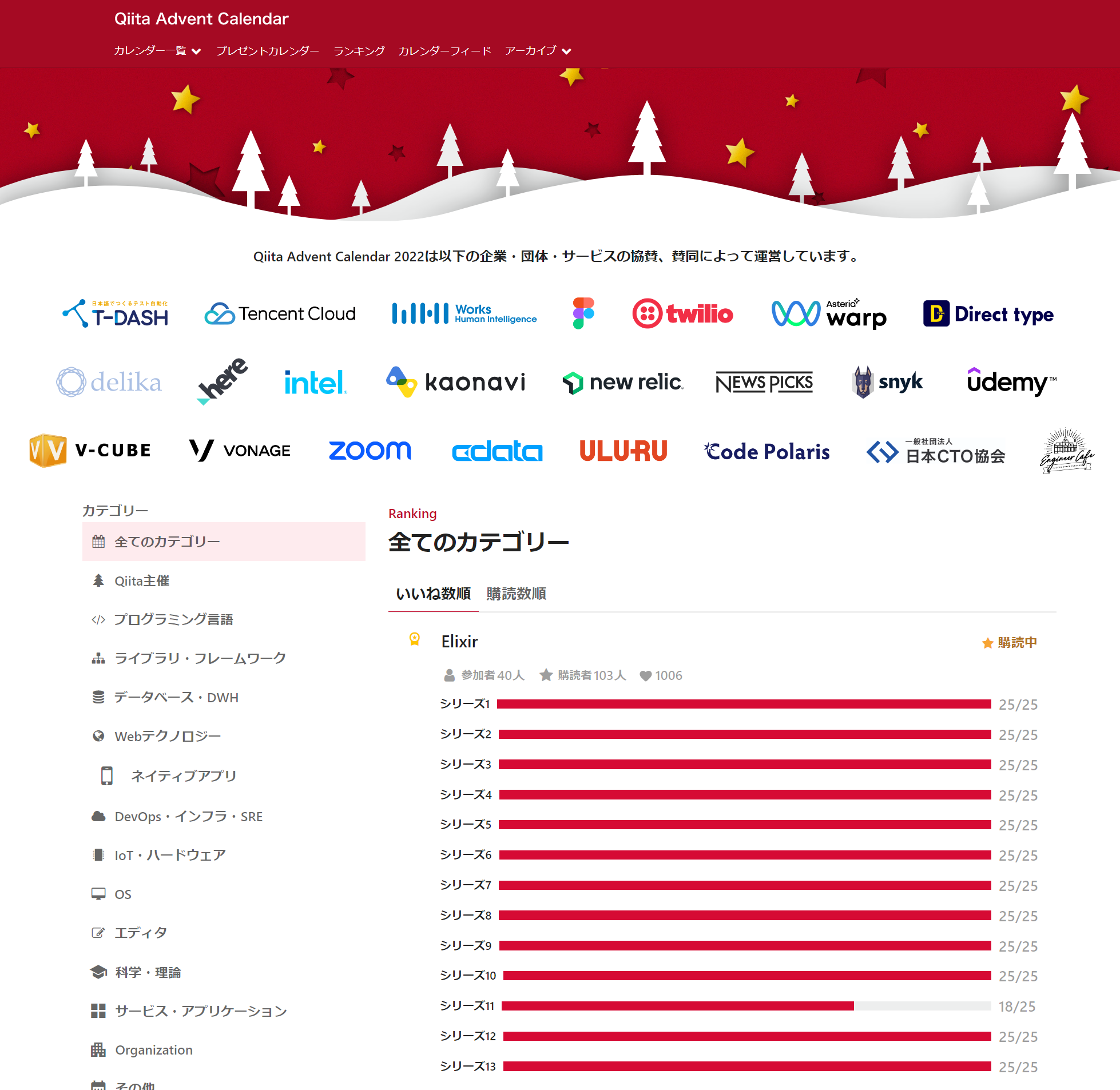
パンデミックとIPFS、DID
Alex Housand(AH): Welcome to Elixir Wizards, a podcast brought to you by SmartLogic, a custom web and mobile development shop based in Baltimore. My name is Alex Housand and I'll be your host. I'm joined by my guest co-host today, Dan Ivovich. Hello, Dan. How are you?
Dan Ivovich(DI): Hello, it's good to be here.
AH: It's great to have you. I know you're a little nervous, but it's going to be great. You're going to be great. My producer, Bonnie Lander. This season's theme is the Impact of Elixir. Today we're joined by a very special guest, Brooklyn Zelenka. Brooklyn, how are you?
Brooklyn Zelenka(BZ): I'm doing well. Thanks for having me back.
AH: It's great to have you on. I think this is your fourth time on?
BZ: Something like that, thereabouts.
AH: Thereabouts, excellent. What's been new with you since the last time you were on?
BZ: It's actually been a while since the last I was on, like maybe almost two years. Spent pretty much the entire pandemic in between.
AH: A lot has happened in the pandemic.
BZ: Lots been going on. Yeah. Lots of keynotes, also panels, I've been getting really involved in decentralized web stuff, the interplanetary file system, which I'm sure we'll talk about through this. Got involved with Decentralized Identity Foundation, and have been really excited now as we seem to be slowly, hopefully exiting the pandemic to be traveling again.
Alex Housand(AH):Elixir Wizardsへようこそ!このPodcastは、ボルチモアを拠点とする独自Web/モバイルを開発する企業であるSmartLogicがお届けします。私はAlex Housand、ホストを努めます。今日はゲストに、共同ホストであるDan Ivovichが参加しています、こんにちは、ダン。お元気でしたか?
Dan Ivovich(DI):こんにちは。参加できてうれしいです
AH:お迎えできて嬉しいです。ちょっと緊張してるように見えるけど、素晴らしい時間になるでしょう。プロデューサはBonnie Landerで、今シーズンのテーマは「Elixirの衝撃」です。今日はスペシャルゲスト、Brooklyn Zelenkaが参加しています。Brooklyn、お元気でしたか?
Brooklyn Zelenka(BZ):元気ですよ。また呼んでくれて、ありがとうございます
AH:ご出演いただき嬉しいです。今回でたしか4回目の出演でしたっけ?
BZ:そうですね、そのくらいですね
AH:そのくらい、いいですね。前回の出演以来、何か新しいことはありましたか?
BZ:実は、私が最後に出演してから結構経ってて、恐らく2年近くになりますね。その間は、ほぼパンデミックでした
AH:パンデミック中は、色々なことがありましたね
BZ:色々ありましたね。えぇ。たくさんの基調講演やパネルディスカッションがありました。私は「分散型Web」、つまりIPFS(InterPlanetary File System:惑星間ファイルシステム)に深く関わってきましたが、これについては追って説明します。DID Foundation (訳注:DID(Decentralized Identity)…分散型IDと呼ばれるWeb3.0の中核技術の国際標準化団体)にも参加しましたが、ゆっくりとパンデミックから抜け出していき、再び旅に出られると思うと本当に嬉しいです
バンクーバーとモントリオール、森林火災
BZ: I'm actually in Montreal right now. I'm normally based in Vancouver, but enjoying the cold or not enjoying the cold, depending on the exact day.
AH: Yeah. That's fair. What people cannot see is that you are in an, a 19th century?
BZ: That's right. Yeah. This building that we're staying is all old stone walls. It was built in the mid-1800s. It's actually older than Canada. It's a cool, little fact.
AH: That is cool. You're based in Vancouver, usually. What's colder Vancouver or Montreal?
BZ: Colder. Oh, definitely Montreal. Vancouver has the same weather as Seattle, essentially. Rainy, but not that cold, and not that hot in the summer.
AH: Lovely. That sounds great.
DI: It not hot in summer is all about, that's...
BZ: Right, yeah.
AH: Not that hot. Does Vancouver hit by the heat wave that recently swept through the Pacific Northwest?
BZ: We had a couple days of that and a lot of forest fires, for the last couple years, which is not so fun. There was a couple, smaller cities or towns in the interior that just aren't there anymore, because wildfires just swept through. Things are definitely it's amazing how many once in a lifetime disasters you can have in a couple of years, right? They seem to be stacking up. Yeah. Not great, so it's normally quite cool in Vancouver in the summer, but less so now.
AH: It's so true and also so sad. You're like, what did I experience this year? A pandemic, forest fires, something else, another thing, yeah. Not to be too depressing.
BZ:今、モントリオールにいます。いつもはバンクーバーが拠点ですが、日によって寒さを楽しんだり、楽しまなかったりします
AH:あぁ、それはほどよいですね。みんながあなたを見れないのは、あなたが19世紀にいるからですか?(訳注:AHはBZが19世紀の建物にいるのを知ってて、この冗談を言っていると思われる)
BZ:えぇ、その通りです。私達がいるこの建物は、全て古い石壁なんですよ。1800年代半ばに建てられました。実はカナダより古いんです。これはクールですね
AH:凄いですね。あなたの普段の拠点はバンクーバーですが、バンクーバーとモントリオール、どちらがより寒いですか?
BZ:より寒い? … あぁ、それは間違いなくモントリオールですね。バンクーバーは基本的にシアトルと同じような気候です。雨は多いけど、それほど寒くないし、夏もそれほど暑くは無いです
AH:素敵。それはいいですね。
DI:夏でも暑くないのは、それはそれで …
BZ:そうですね、えぇ
AH:それほど暑く無い。バンクーバーは、最近、太平洋岸北西部を襲った熱波に見舞われてましたよね?
BZ:数日前から熱波に見舞われていますし、良くないことに、ここ数年、森林火災が多発しています。内陸部の小さな都市や町が、山火事で無くなってしまったんです。数年の間に「一生に一度」の災害が何度も起こるというのは、本当に驚くべきことです。頻発しているように思えます。バンクーバーは夏でも涼しいんですが、今はそうでも無いんです
AH:本当にその通りで、とても悲しいことです。今年、私は何を経験したでしょう?パンデミック、森林火災、他にもありますが、えぇ、あまり落ち込まないようにね
Brooklyn Zelenkaの会社「Fission」のパンデミック影響
AH: You're at Fission, right now. Fission, Fission.
BZ: Fission.
AH: Fission. How long have you been there?
BZ: Since 2019. I guess, coming on to three years soon, two and a half years, I guess now. I'm one of the Cofounders and the CTO there. Yeah. We're an applied research company focused on Webtech, Edge applications and Hot Data. Data that's moving around, rather than stored in place. I guess, if you want to put it a broad category on it, we're working on the new internets and trying to move that needle forward.
AH: Cool. What was it like being at a company, I guess, starting in 2019 and then the pandemic hit? With that hard, difficult, easy, not?
BZ: Yeah. It was. I mean, I think, it was weird for everyone, because a lot of things changed, but we had already been a fully distributed team. Myself, my co-founder are in Vancouver, but we have people in Europe and all through the US and Toronto. Not being able to go into the office was a non-issue, but it's definitely accelerated some things. People know what QR codes are now, just like everyone, because you go to a restaurant, if you're in a place that has restaurants open again and you have to scan on menu and all this stuff.
It's been interesting how some of the tools that we're using in 2019, that nobody knew about are now just super commonplace. In a lot of ways being an early stage company and venture backed, it meant that we weren't really taking payment from customers at the time anyway, so it didn't really affect us from that angle. But it also makes it when there's big world changing events, people sometimes wants to just stick with the things that they already understand and they already know. It's been a bit good and a bit bad, which I think is the theme for the last two years for everyone.
AH:あなたは今、Fission で働いていますね。フィション?フィジョン?
BZ:フィジョンです
AH:フィジョンですね。どの位になりますか?
BZ:2019年からです。もうすぐ3年になりますね、いや2年半かな。私はそこの共同設立者の一人で、CTOです。私達は、Web技術、エッジアプリケーション、ホットデータ(訳注:即座にロードされ、利用可能なデータ。反対のコールドデータはロードに時間がかかり、即座には使えない)に焦点を当てた応用研究企業です。データは固定されているのではなく、動き回っているものです。大雑把に言えば、新しいインターネットに取り組んでいて、歴史の針を先に進めようとしているのです
AH:クール。2019年に企業をスタートして、パンデミックに見舞われるというのは、どんな感じだったんでしょうか? 大変? 困難? 簡単? どうでしょうか?
BZ:えぇ、色々なことが変わったので、みんなに違和感を与えたかと思いますが、私達はすでに完全分散型チームになっていたんです。私と共同創設者はバンクーバーにいますが、ヨーロッパ、アメリカ、トロントの各地に社員がいます。オフィスに出社できないことは問題ではありませんでしたが、それにより早まったこともありました。QRコードが何であるかは、今や誰もが知っていることですが、レストランの営業が再開し、行ったとしたら、メニューやその他色々なものをスキャンすることになるでしょう
2019年には、誰も知らなかったようなツールが、今では凄く当たり前に使えるようになっていて、とても興味深いです。私達はアーリーステージの企業で、ベンチャー支援を受けていたため、お客さまからお金をいただいておらず、あまり影響がありませんでした。しかし、世界を変えるような大きな出来事があると、人は自分がすでに理解していることと、知っていることに固執するものです。良いこともあれば、悪いこともある、それがこの2年間のみんなのテーマだと思うんです
発酵:パンデミック中の趣味
DI: We read in the interview that you're very into fermenting things, or you've been fermenting?
BZ: Yeah. So that was my pandemic hobby. I think a lot of people developed, arts and crafts things when stuck inside. I've been making Tepache, just like a pineapple beer and ginger beer at home. It's actually, shockingly easy. Nothing has gone too, too bad. Though I have a colleague who was also doing this, but with berries, and that exploded, and was not possible to get out of the walls and have to repaint and all of this stuff. I've not had any disasters, which is thankfully. Yeah. It's nice to be able to than really customize what you're drinking, the exact spices, how sweet or dry it is, we can get it pretty much down to almost a sparkling wine. I actually have, I was just putting this together a few days ago, because somebody was asking for it. I have a now PDF Tepache Recipe that I can always share. If you want you can put it in the show notes.
DI: Sure. Yeah. Everyone's looking for new hobbies. The last two years were certainly a case for that. I did experiments a little bit. I on the sourdough train, a little late in the pandemic.
BZ: Nice.
DI: Yeah. Fermenting, I did beer back in the day, haven in a while. Exploding bottles, definitely a concern. Yeah. Then as someone who spent a lot of the pandemic painting my walls, I do not envy having to do that, again. Glad that I have not exploded any fermented projects onto my walls. That's super interesting. We love talking about people's hobbies.
DI:インタビューの中で、あなたが発酵モノに凝っていると読みましたが、発酵食品を作っていたのですか?
BZ:そうですね。それがパンデミック中の趣味でした。多くの人が閉じ籠もっているとき、絵を描いたり工作をした思います。私は、パイナップルビールやジンジャービールのようなテパチェ(訳注:微発泡の爽やかな味わいの発酵した飲み物)を家で作っていました。実は、驚くほど簡単なんです。あまり酷いものにはなりません。でも、同僚は、テパチェをベリーで作っていたら、それが爆発して、壁から取れなくなり、ペンキを塗り直したり、色々と大変でした。幸いなことに、私は失敗したことがないんです。スパイスや甘さ、辛さなど、飲むものをカスタマイズできるのは嬉しいですね。スパークリングワインのようなんです。実は数日前に、ある人から頼まれたので、これをまとめていたところなんです。テパチェのレシピをPDFで公開していますので、いつでもご覧ください。もし良かったら、Podcastのshow noteに載せてください
DI:もちろんです、えぇ。みんな新しい趣味を探ってますね。この2年間、確かにそうでした。私は少し実験をしました。サワードウトレインに乗りました(訳注:サワードウというパン種を使ったパン作りの流行に乗ること)、少し遅れての流行だったんですけどね
BZ:良いですね
DI:えぇ。昔はビールを作っていましたが、今はやっていません。瓶の爆発は確かに気を付けないといけないことですね。それから、パンデミックのときに、壁にペンキを塗ってたのは、あまり羨ましく無いですね。私は発酵プロジェクトで壁を爆発させたことはありません。凄く楽しいですね。誰かの趣味の話をするのは大好きです。
エッジコンピューティングと、その反対のLiveView
DI: All right, so an Edge app. Talk to me about, we're talking about distributed computing, you've alluded to a lot of different ways in which you're pushing things to the edge. What does that mean to you?
BZ: Yeah, so edge computing serve broadly, is about moving all the primary resources, so storage, compute, etc. closer to a user, to give them a faster experience, because you don't have to wait for latency of all of these messages moving around below the speed of light, right? If everything sitting in US East one, then both, it can take some hundreds of milliseconds to get there, a couple 100 milliseconds to get back and when those servers go down, they break the entire Internet. If you have something that's a little bit more distributed and closer to users and we're really talking down the block within some a small number of kilometers or at the extreme, what we've been mostly working on directly on device, you can get down to zero latency.
So having things be extremely snappy, which hasn't really been explored as much in web apps, but native apps. So the apps on your iOS or Android device for example, a lot of them already work this way, right? It's been difficult to do on the web, because we haven't had the APIs for it until quite recently. Some of the techniques to do distributed databases things like that, that go all the way down to a client device are quite new, so quite bleeding edge. So getting to push that forward.
You can think of the model roughly as the exact opposite of Phoenix LiveView, right? In LiveView, you're sending all the data, there's a single source of truth in a database, and it will calculate the updates to some state and then send back either Delta on the state or even maybe some HTML back over the wire. Everything's really happening at the server and you're getting small amounts of it back. With edge computing, you're doing everything locally and only sending to others the small amounts that they need to stay in sync with you. So there isn't a single source of truth anymore.
There's the overall states that everyone who's, if you have a collaborative app, or you need to push data somewhere else. Only the stuff that they need to do, to make the update for their machine, but you can do everything completely locally, offline, with poor connection, poor connection, no longer matters, because your machine, that should be your iPhone, your laptop, whatever, it has everything baked into it. Or, if you're using Edge infrastructure, so something like an Edge datacenter, or an Edge PoP, Point of Presence, it might be literally down the block from you.
When we take that again, right down onto the device, the other advantage is you don't have to learn the entire stack anymore. You don't have to maintain a back end, maintain a database, learn DevOps, Kubernetes, any of that stuff is just directly on your machine, and then having some method for synchronizing the data underneath. It's obviously very different from how things work today, which is why I think, it breaks a lot of people's brains. Again, this is the absolute bleeding edge for that space.
DI:では、エッジアプリにいきましょう。分散コンピューティングの話ですが、あなたは様々な方法で、物事をエッジに押しやっていると言っていました。あなたにとって、それはどのような意味を持つのでしょうか?
BZ:エッジコンピューティングとは、広義には、全ての主要なリソース、つまりストレージや計算などをユーザの近くに移動させ、より高速な体験を提供します。なぜなら、光速に近いスピードで移動するメッセージの遅延を待つ必要がないからです。もし、すべてのサーバがアメリカの東海岸に置かれているとしたら、そこに行くのに数百msec、戻ってくるのに数百msecかかりますし、そのサーバがダウンするとインターネット全体が壊れてしまいます。もし、もう少し分散して、ユーザの近くにあれば、数Km以内のブロックや、極端なことを言えば、私達が取り組んでいるようなデバイスに直接接続することで遅延をゼロにすることが可能です
これはウェブアプリではあまり研究されていませんが、ネイティブアプリでは非常に高速に動作します。例えば、iOSやAndroidデバイスのアプリは、その多くがすでにこの方法で動作していますよね? Webでは、つい最近までAPIが無かったため、実現が困難でした。クライアントデバイスまで到達する分散型DBを構築する技術は、かなり新しく、最先端を行くものです。ですので、それを推し進めることにしました
このモデルは、Phoenix LiveView(訳注:サーバサイドでリアルタイムフロントが書けるElixirフレームワーク)の正反対と大まかに考えることができるのではないでしょうか? LiveViewでは、すべてのデータを送信し、DB内に信頼できる唯一の情報源があり、ある状態への更新を計算してから、差分データやHTMLをネットワーク経由で送り返します。全てがサーバで行われ、その中から少量のデータが戻ってくるのです。エッジコンピューティングでは、全てをローカルで行い、同期を維持するために必要な少量のみを他のユーザ送信します。つまり、信頼できる唯一の情報源はもうありません
コラボレーションアプリを使用している場合、またはデータをどこかにプッシュする必要がある場合は、全員が全状態を共有します。自分のマシン用にアップデートをするために必要なものだけが、完全にローカルで、オフラインで、接続が悪くてももはや問題ではありません。あなたのマシン、つまりiPhoneでもラップトップでも何でもいいのですが、そのマシンにすべてが組み込まれているのですから。また、エッジ・インフラストラクチャ、つまりエッジ・データセンターやエッジ接続点(PoP:Point of Presence)のようなものを使っている場合、それは文字通り、あなたのすぐ近くのブロックにあるかもしれません
このようにデバイスに落とし込むと、もう1つのメリットは、スタック全体を学習する必要がなくなることです。バックエンドやDBのメンテナンス、DevOps、Kubernetesなどの学習が不要です。これらは全て、自分のマシン上にあり、直接、データを同期させることができるのです。これは明らかに現在の仕組みとは大きく異なるので、多くの人の頭を混乱させることになると思います。繰り返しますが、これはこの分野の最先端なのです
コンテント・アドレッシング:データの置き場は問わない
DI: When you talk about some mechanism for synchronizing, that's what you're expecting the platform, the SDK layer is handling that for you in that scenario?
BZ: Yeah. Exactly. In the same way that we use, say Postgres, and you're not a expert in the internals of how Postgres does data storage or the exact data structures and how it's going to serialize it to disk, these SDKs. So for example, our SDK is called Web native and it's knows how to store and address data in a distributed manner, and also keeping everything offline first or local first.
DI: So then, as a developer have to make that decision around what is local versus what is an Edge node versus what is maybe on a further away Edge node, or how does that network balance?
BZ: Yeah. So the core idea, at least for our approach is the location no longer matters for the data. There's a few details in there that I'm glossing over about, like how exactly we do that? The short version is, if everything should be completely local first and run directly on your device and we recognize that there's at minimum speed of light latency between things, we're making lots of updates. We need already then to be able to update separate bits of data that are now diverging.
In the same way that you have, your main branch on a Git project and then you have all these branches that come off of it. Then a mechanism for merging them back together again, if we have an automated way of doing, then it doesn't matter where the data lives anymore, but we care about is what the data is, right? This is part of how we to do this, is something called Content Addressing.
In traditional systems, what most people are using today, you have a URL that is really a underneath, that's an IP address. It says, go to this computer, and ask it for this file, right? So that's saying, go to this specific street address and ask them for the book that is on shelf three, this far into the bookstore, content addressing says, this is the data that I want. I want whatever file has this hash associated with it, for example. I don't care which bookstore you get it from, go into any bookstore and ask for Warren Piece, and they'll be able to hand it to you.
If I have a copy, you have a copy, there's one of the library or one of the bookstore, it doesn't matter anymore. We get a bunch of niceties from that. So being able to move these resources around transparently without having to at least at the base case, without having to say move this here, and move this there, because they're just copies. I don't only have to get it from one place. Just how BitTorrent works and you can get little parts of it from many sources and maybe they're very close to you or somebody that has a local cache, because they've looked at it recently, we can do the same, but for all data on the web.
DI: Cool.
DI:あなたが話してくれた同期のための何らかのメカニズムというのは、プラットフォームやSDKレイヤーがそのシナリオでハンドリングしてくれることを期待していますか?
BZ:そうですね。その通りです。私達はPostgreSQLを使うとき、PostgreSQLがどのようにデータストレージを実現し、正確なデータ構造やディスクへのシリアライズをどう行うかといった内部事情に詳しい訳ではありませんが、こうしたSDKを利用することができます。たとえば、私達のSDKは「Webネイティブ」と呼ばれ、データを分散して保存し、アドレス指定する方法を知っていますし、全てをオフラインファーストまたはローカルファーストに維持します
DI:そうすると開発者としては、ローカルにあるものとエッジノードにあるもの、あるいは遠くのエッジノードにあるもの、もしくは、どのようにネットワークのバランスを取るかといった判断をしなければなりませんか?
BZ:えぇ。つまり、少なくとも私達のアプローチの核となる考え方は、データにとって場所が重要で無くなったと言うことです。具体的にどうすればいいのでしょう?簡単に説明すると、まず全てが完全にローカルで、あなたのデバイス上で直接実行されるべきで、物事同士の間に最低でも光速の遅延がある場合、私達は多くのアップデートを行います。そのとき、すでに分割されている別々のデータを更新できるようにしておく必要があるのです
Gitのプロジェクトでメインブランチがあり、そこから派生したブランチがあるのと同じです。それらを再びマージする仕組みがあり、それを自動化できれば、データがどこにあるかはもう問題ではなく、そのデータが何であるかに関心が向くでしょう?これが、コンテント・アドレッシングと呼ばれる手法です
従来のシステム、つまり今日ほとんどの人が使っているものでは、URLというものがありますが、これは実際にはIPアドレスです。このコンピュータにアクセスして、このファイルを要求してください、と記述されています。つまり、この特定の住所に行き、書店のこの奥の棚番号3にある本をください、と言うのと同じです。コンテント・アドレッシングは、「これが私が欲しいデータだ」と言っています。たとえば、このハッシュを持つファイルなら何でも欲しいと言うことです。どこの書店に行っても、「Warren Piece(訳注:The New Dylansという音楽グループのCDアルバム)をください」と言えば、どの書店で入手するかは気にすること無く、あなたに渡してくれるはずです
私が持っていても、あなたが持っていても、図書館のものがあっても、本屋のものがあっても、もう関係無いんです。私達は、そこからたくさんの素敵なものを得ているのです。少なくとも基本的なケースでは、リソースを透過的に移動させることができるので、「これをここに移動して、これをここに移動して」と言う必要がありません。なぜなら、それらは単なるコピーだからです。1つの場所からしか入手できないわけではありません。BitTorrentの仕組みのように、多くの提供元から少しずつ取得することができ、その提供元はあなたのすぐ近くにあったり、最近見たからとローカルキャッシュを持っている人がいるかもしれませんが、同じことをWeb上のすべてのデータに対して行うことができます
DI:クールですね
- Translator's impression : 訳者の感想 -
(English version)
From the very beginning, the book is full of trending distributed technologies such as interplanetary file systems, DID, edge computing, LiveView, edge PoP, and content addressing, and I can't stop reading and getting excited!
I've been working on edge computing development for the past two years, and I feel like I've suddenly been thrust into a "different world" with content that I'm not usually familiar with ... in a good way, of course!
What I can tell you so far is that it's a completely different world from the one we're used to seeing on the Internet or in the cloud, and I'm extremely happy and honored to be able to translate Brooklyn Zelenka's podcast into Japanese.
The rest of this column will be published on February 14!
(日本語バージョン)
IPFSやDID、エッジコンピューティング、LiveView、エッジPoP、コンテント・アドレッシングと、初っ端からトレンドの分散系技術てんこ盛りで、読んでてワクワクが止まらない展開ですね
私も2年前からエッジコンピューティング開発をしていますが、普段、なかなか聞き馴染みの無い内容が飛び出してきて、いきなり「異世界」に突っ込まれた気分です … もちろん良い意味で、です
ここまでの時点で分かることは、これまでのインターネットやクラウドとは全く違う世界観が展開されており、そういう分野の専門家であるBrooklyn ZelenkaのPodcastを日本語訳できることは、凄まじく幸福で、光栄だということです
さて、この続きのコラムは、2/14に公開です ![]()
このPodcast翻訳シリーズ全体は、以下の通りです
[翻訳] ①Brooklyn Zelenka and The Exciting World of Edge Computing
|> [翻訳] ②Brooklyn Zelenka and The Exciting World of Edge Computing
|> [翻訳] ③Brooklyn Zelenka and The Exciting World of Edge Computing
|> [翻訳] ④Brooklyn Zelenka and The Exciting World of Edge Computing
Elixirコミュニティのご紹介
4. LiveView JP : A place to mob-program in LiveView, LiveBook+Nx+Axon, and elixir-desktop
5. Neos.ex : A place to connecting Elixir and NeosVR to create a new world
